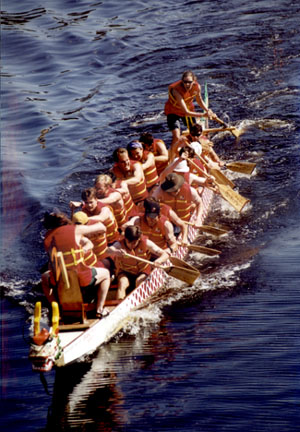Dudley House breathes fire at Dragon boat race

As the Philadelphia Men’s Dragon Boat Team paddled ahead of the pack in New York’s 2001 Hong Kong Dragon Boat Festival, they were pursued by an unlikely rival. Rhythmically plunging their paddles forward, steadily pulling their paddles back, the Harvard Dudley House Dragon Boat team stroked to keep pace with the first-place team. The team from Philadelphia, which recently represented the United States at the International Dragon Boat Federation Championship, sliced through the murky waters of Meadow Lake to earn victory and $2,000 of the $10,000 in cash awards they would win that day. Yet no team was happier with its finish than the undersized team from Harvard.
“We’ve come so far,” explained Sara Cronenwett, a Ph.D. candidate in physics. “To finish second in a race of this caliber is really exciting.” The Open Championship race, in which the Harvard team competed, was the premier race of the festival held in Flushing Meadows-Corona Park, Queens, N.Y. on Aug. 12. More than 90 teams competed in several divisions, paddling wooden boats in races of 250, 500, and 1,000 meters. Many of the teams are sponsored by local and national businesses, their oversized biceps stretching sponsors’ names on the spandex uniforms they wore.
The Harvard team sports neither spandex nor bulging muscles. “It’s all about timing,” says team captain Xiaohui Lu, a biology Ph.D. student studying the structure of proteins. “We may be the scrawniest team, but our focus and technique allow us to succeed.”
A dragon boat is powered by 18 paddlers sitting in nine rows of two. With rectangular paddles they churn the water, the timing of each stroke marked by the drummer, seated in the bow. A helmsman (or woman) in the stern steers the boat. The boat itself is constructed of teak and weighs 1 ton. The snarling, red face of a dragon extends from the bow, and the boat is trailed by its sharp reptilian tail.
Dragon boat racing is based on a 2,000-year-old Chinese tradition. In the third century B.C.E., Qu Yuan, a popular government minister, was exiled from his Chu Kingdom for offending the emperor. He spent his years in exile writing poetry about the homeland he loved. Then, upon hearing of the invasion of the Chu Kingdom by rival forces, the distraught poet flung himself into the Mi Lo River. Local fishermen attempted to save him from hungry fish by thrashing the water with their paddles and thumping drums. The fishermen could not save their beloved bard, but their efforts and the reverence for Qu Yuan, who became one of China’s most famous poets, spawned the dragon boat festivals. Such festivals are now celebrated throughout the world, including the Boston Dragon Boat Festival held in June. In addition to racing, the festivals celebrate Chinese culture, featuring traditional foods, dances, and music.
The Harvard 20 got their start at the 1999 Boston festival. Looking for a summer diversion, members of the Dudley House intramural crew team decided to enter the upcoming dragon boat races, hoping their familiarity with rowing in time might translate to the angular dragon boat paddles. And although this abrupt, aggressive stroke was not similar to the lengthy pull of the oars they knew, the team enjoyed immediate success, finishing second in the local division. Spurred by a similar finish in the 2000 festival, and an increased level of interest among students, in 2001 the team entered the Open Championship division, which promised entry to the New York festival for the winners. The team from Dudley House met the challenge, outdistancing the best teams in Boston, including a particularly pectoral team from AsiaFoods.com.
While timing and enthusiasm were sufficient to beat the brawn of Boston, the competition in New York would be of much higher quality, including two teams that compete to represent the United States internationally. A higher level of performance was required, and so the coaching services of Don Fisher, a certified Olympic canoeing coach, were enlisted. For eight weeks the team stirred the waters of the Mystic River in Somerville, drawing bewildered stares from the anglers and kayakers they passed.
Their hard work was well rewarded. In addition to the second-place finish in the 1,000 meters to the top-ranked Philadelphia team, Harvard finished third in the 500 meter and 250 meter, placing in the top three in all events. While thrilled with their unexpected success, many members of the team enjoyed the festivities as much as the races. “It’s not just about winning,” said Jeff Cruzan, postdoctoral fellow in physical biology, as he shoveled another mouthful of noodles with chopsticks, “it’s about being part of a great cultural tradition.”




